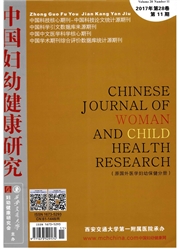

 中文摘要:
中文摘要:
多囊卵巢综合征病因尚不明确,一临床和生化特征表明其可能与遗传和非遗传因素均有关系。多囊卵巢综合征不同表型可能是由不同基因作用而引发的。探讨青春期易患多囊卵巢综合征的危险性因素,无疑对研究多囊卵巢综合征具有十分深远的意义。先天男性化、低出生体重儿、肾上腺功能早现,尤其是肾上腺功能亢进、非典型性早熟、伴有黑棘皮症的顽固性肥胖、代女谢综合征、假肾上腺皮质功能亢进、儿童早期假肢端肥大症等极易引发青春期多囊卵巢综合征。因此,研究青春期易患多囊卵巢综合征的危险因素可有效防止与多囊卵巢综合征密切相关的近期和远期并发症。
 英文摘要:
英文摘要:
The cause of polycystic ovary syndrome (PCOS) is undetermined now. The clinical characteristics and biochemical features of the disease suggest that the disease could be associated with both genetic and non-genetic factors. Different phenotypes of PCOS in clinic may be caused by interactions of different genes. Investigating risk factors of vulnerability of PCOS is of profound significance. Congenital masculinization, low birth weight infant, premature adrenarche, especially hyperadrenalism, atypical sexual precocity, intractable obesity associated with acanthosis nigricans (AN) , metabolic syndrome (MS), pseudohyperadrenocorticism, pseudoacromegaly in early childhood and so on are prone to induce PCOS in puberty. Therefore, investigating risk factors of vulnerability to PCOS in puberty can prevent short- term and long-term PCOS-associated complications effectively.
 同期刊论文项目
同期刊论文项目
 同项目期刊论文
同项目期刊论文
 期刊信息
期刊信息
